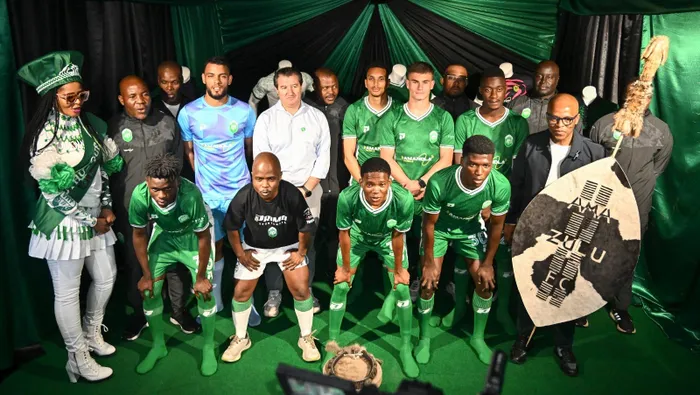“Teko Modise sent shivers down our spines,” says Zungu as AmaZulu announce youthful strategy alongside new signings
PSL

Sandile Zungu, president of AmaZulu, Arthur Zwane, head coach and his coaching team with the new players and management during the Betway Premiership Fan Experience in Durban. | BackpagePix
Image: BackpagePix
A blunt critique from Teko Modise has triggered a major shift at AmaZulu, with the club unveiling a youthful strategy and fresh signings ahead of the 2025/26 Betway Premiership season.
During the official launch held in Durban on Tuesday, club president Sandile Zungu admitted that Modise’s searing analysis of Usuthu’s struggles last season was a turning point.
The former Bafana Bafana midfielder labelled AmaZulu a “retirement home” and criticised their continued pursuit of players well past their peak.
The two-time Footballer of the Year, speaking as a football analyst, accused AmaZulu of becoming a destination for fading talent instead of focusing on building a competitive, youthful team that can grow together.
“We took what he said to heart,” Zungu said.
“He said we had become a dumping ground for players who have failed in their careers and we took that to heart, we were not angry but we thought maybe he has a point.”
The club responded with bold action. Zungu revealed that AmaZulu have released 17 players — including experienced campaigners Ramahlwe Mphahlele, Veli Mothwa, and Mbongeni Gumede — and slashed the average age of the squad from 30 to just over 24.
“This time last year our average age was 30 years but we have now cut that down to just over 24 years and with the quality remaining the same if not better,” Zungu added.
“So we thank Teko for his views, views that sent shivers down our spine which is why we’re here now.”
As part of their refreshed approach, AmaZulu announced the signings of striker Thando Ngwenya (23), defender Keagan Allen (25), goalkeeper Darren Johnson (28), and the return of Ryan Moon (29) to bolster their attack.
In addition to those experienced but still youthful acquisitions, Usuthu have promoted three players from their academy — a clear signal of intent to build from within and place trust in their developmental pipeline.
“We understood that perhaps he doesn’t hate the club but rather would want to see us succeed and that’s why he is raising this issue sharply,” said Zungu.
AmaZulu’s reset isn’t just about age — it’s a cultural change aimed at long-term progress rather than short-term fixes.
With a younger squad, renewed energy, and lessons taken from a painful season, Usuthu are ready to step into a new chapter.
The coming campaign will test the depth of that transformation, but one thing is certain: AmaZulu are no longer content with old habits. They’re investing in the future — and doing so with purpose.
Related Topics: